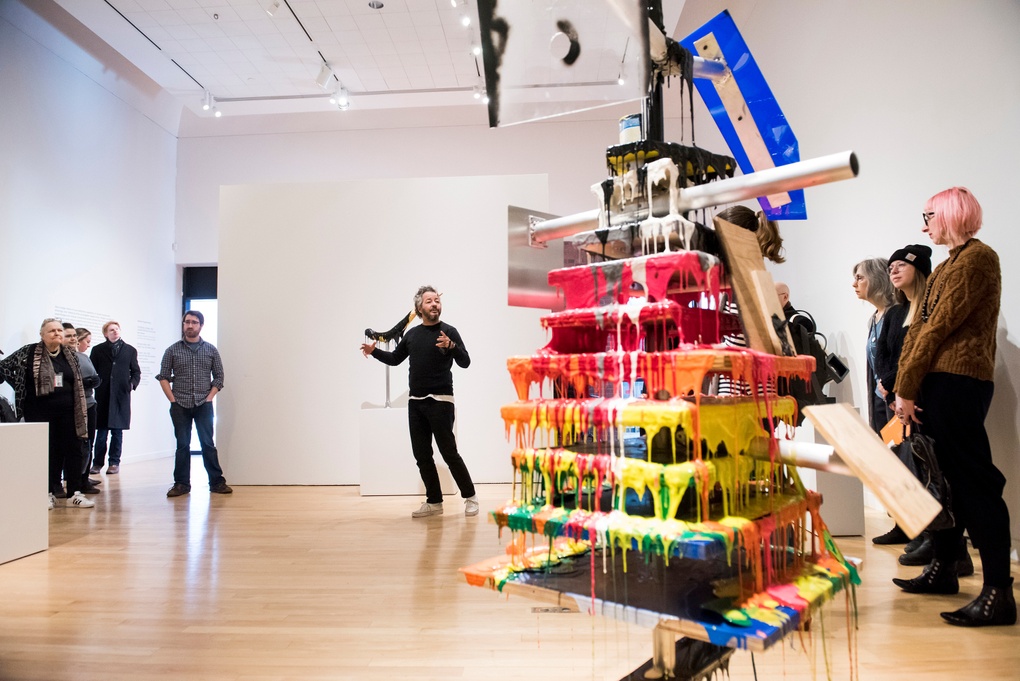About
As the home for visual arts at Tufts University, Tufts University Art Galleries (TUAG) creates a dynamic learning space through a responsive program of exhibitions, events, collecting, and scholarship across our two locations—in Medford at the Aidekman Arts Center, and in Boston at SMFA at Tufts.
Mission

As the home for visual arts at Tufts University, Tufts University Art Galleries (TUAG) creates a dynamic learning space through a responsive program of exhibitions, events, collecting, and scholarship across our two locations—in Medford at the Aidekman Arts Center, and in Boston at SMFA at Tufts.
As an academic art center, TUAG’s primary mission is to provide space where visual arts and learning intersect at every level — as both an open classroom for students, faculty and community members, and as a laboratory where artists can develop experimental practices.
We believe art and artists have an extraordinary impact on our world, and we ground our work in the values of care, learning, dialogue, and the creative process. We are driven by our belief in the impact of art and artists on our world and grounded in the values of care, learning, dialogue, and the creative process.
What We Do
Tufts University Art Galleries (TUAG) has two locations—at the Aidekman Arts Center in Medford and the School of the Museum of Fine Arts (SMFA) in Boston. TUAG exists to advance learning through exhibitions, artist engagement, and innovative programming. Our galleries are free and open to all, creating critical spaces for reflection, conversation, and imagination.
We oversee the exhibition spaces in the Shirley and Alex Aidekman Arts Center in Medford, the galleries and public programs at the School of the Museum of Fine Arts (SMFA) at Tufts in Boston, and Tufts University’s Permanent and Public Art Collection. Our galleries present up to four major exhibitions per semester, including one-person and group exhibitions, centered on contemporary topics. TUAG staff install and maintain the Permanent and Public Art Collection throughout Tufts’s four campuses and work closely with faculty and students to develop curricular exhibitions for public spaces throughout the Medford and SMFA at Tufts campuses. Each spring in conjunction with commencement, our galleries in Medford and Boston showcase the thesis work of graduate and undergraduate SMFA at Tufts students.
In addition to our temporary exhibitions, TUAG produces public programs with leading contemporary artists and scholars. Guests present public artist talks, as well as give performances and workshops and participate in symposia in dialogue with the SMFA at Tufts and Tufts community.
Commitment to Inclusion and Equity

We at Tufts University Art Galleries believe that artists’ voices are essential to building a just world. In solidarity with those working toward equity and justice, we are committed to prioritizing equitable work that provides a platform for all art the reflects our community in full. We commit to continual learning and reflection to ensure our doors and programming are open to all.
Land Acknowledgment
Tufts University Art Galleries acknowledges that we reside on the traditional homelands of the Massachusett people and within the territories of the Nipmuc and Wôponâak (Wampanoag) tribes who have cared for this land since time immemorial and whose relationships to this place endure.
The genocide of the original inhabitants of this land, its historic and contemporary erasure, and the continued violations of sovereignty, territory, and waterways are the ongoing manifestations of settler colonialism that we benefit from and must work to transform.
Since their formation, universities have been entangled in colonial knowledge production and dispossession. As a cultural institution situated within a university, we commit to learning, listening, unlearning, acting and being in relationship to Indigenous communities and cultural life.
Collective Futures Fund

The Collective Futures Fund is an initiative directly supporting visual artists and artist-run activity in the Greater Boston area (Norfolk, Suffolk, Essex, Middlesex, and Plymouth counties) through grants of $2,500 and $7,500. We help incubate artists’ visions for their own independent platforms and research to support the futures of our vibrant local artist communities. The Collective Futures Fund is administered by the Tufts University Art Galleries and is a part of the Regional Regranting Program of the Andy Warhol Foundation for the Visual Arts. The Sustaining Practice tier is supported by an anonymous donor.
Support Our Mission

Support Tufts University Art Galleries with a tax-deductible donation and learn more about how to get involved with our efforts to build a campus collection that reflects the diversity of our community.